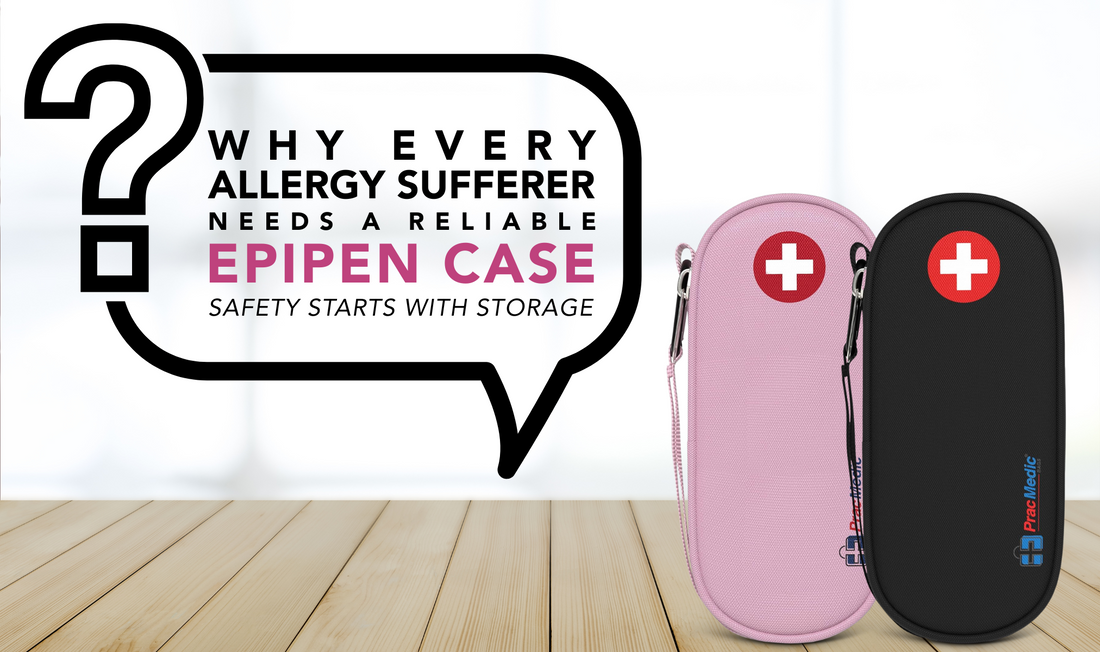
Why Every Allergy Sufferer Needs a Reliable EpiPen Case — Safety Starts with Storage
Share
In a world where allergies are increasingly common and severe allergic reactions can strike without warning, being prepared isn't just smart—it's essential. For millions of allergy sufferers, especially those prescribed an EpiPen (epinephrine auto-injector), preparation starts with proper storage and accessibility. That’s where a reliable EpiPen case comes in. In this blog, we explore why every allergy sufferer should invest in a high-quality case, what features to look for, and how it supports daily life, school, travel, and emergencies.
Understanding the Role of an EpiPen
Epinephrine auto-injectors, commonly known by the brand name EpiPen, are life-saving devices used during severe allergic reactions (anaphylaxis). They deliver a quick dose of epinephrine to reduce symptoms like swelling, difficulty breathing, and low blood pressure.
But carrying the EpiPen loose in a bag, exposed to heat or cold, or misplacing it during travel or outdoor activities, can be dangerous. That’s why a dedicated EpiPen storage case is more than just an accessory—it’s a necessity.
Why a Dedicated EpiPen Case Matters
1. Insulates from Heat and Cold
Epinephrine can degrade when exposed to extreme temperatures. An insulated EpiPen case helps to cushion the epinephrine and is especially useful for outdoor activities or whilst travelling.
2. Easy Access During Emergencies
In an emergency, seconds matter. A properly designed EpiPen holder keeps the auto-injector within reach, avoiding frantic searches through bags or backpacks.
3. Prevents Damage
Loose EpiPens can get crushed or cracked. A Insulative EpiPen case ensures the device remains in proper working condition.
4. Organised Allergy Gear
Good and functional medicine cases include compartments for additional medications like antihistamines or an emergency allergy kit, allowing you to carry all essentials in one place.
5. Ideal for Kids at School
Parents know the struggle of sending kids to school with medical supplies. A labelled EpiPen case for kids ensures school staff can easily identify and administer the medication if needed.
Key Features to Look For in the Best EpiPen Case
- Insulated lining to cushion from temperature changes
- Medical ID tag or label for quick identification
- Zippered or secure closure to keep contents safe
- Compact size that fits into backpacks, purses, or belt loops
- Space for two injectors and extras (ie. allergy meds or first aid supplies)
A good and reliable EpiPen Carry Case should suit your lifestyle—whether it’s everyday use, outdoor excursions, or international travel.
Different Types of EpiPen Storage Cases
- Soft zippered pouches: Lightweight, easy to carry, and budget-friendly
- Hard shell cases: Extra Insulation from physical damage
- Insulated epipen travel cases: Perfect for vacations and road trips
- Children’s themed cases: Designed to appeal to kids, making them more likely to carry it
How to Use Your EpiPen Case Effectively
- Label it clearly with name and medical instructions
- Check contents monthly for expiry dates and wear/tear
- Store in a consistent place (e.g., front pocket of bag)
- Inform caregivers, teachers, and travel companions about it
Allergy Preparedness: Lifestyle Tips
Being prepared means more than just owning an EpiPen case:
- Always carry 2 Epipens plus emergency allergy medication
- Have a written action plan for allergic reactions
- Wear medical alert jewelry
